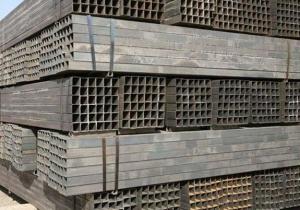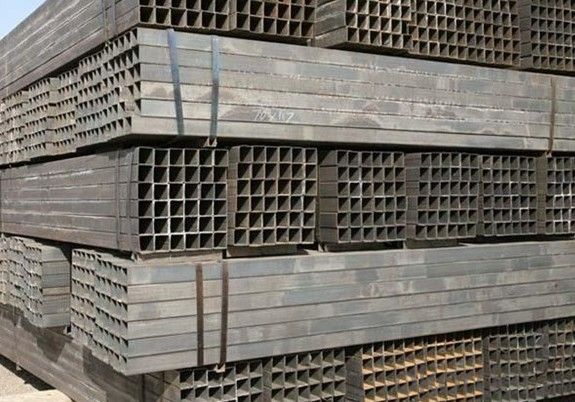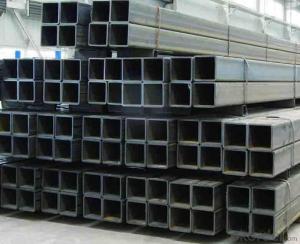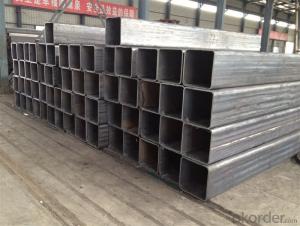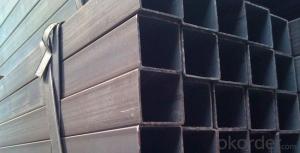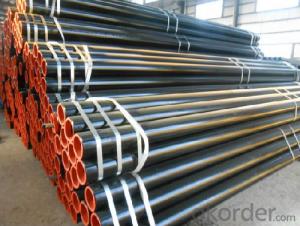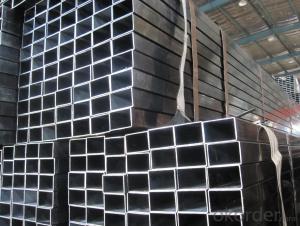ASTM A500/JIS/EN Rectangular hollow section
- Loading Port:
- Tianjin
- Payment Terms:
- TT OR LC
- Min Order Qty:
- 10 m.t.
- Supply Capability:
- 5000 m.t./month
OKorder Service Pledge
OKorder Financial Service
You Might Also Like
Product Name | rectangular hollow section/ RHS | |
Size | Size: | 10*10--500*500mm |
Thickness: | 0.45--16mm | |
Length: | 3-12m | |
Steel Grade | Q195,Q215,Q235,Q345,16Mn, 20# | |
Standard | ASTM A500,EN10219,GB/T6728,GB/T6725,JIS G3466 | |
Usage | 1. For Structure, Airport, Railway 2. Construction and so on. | |
Ends | Plain end or By Your Choice | |
Surface | Bared Or With Oiled Or Galvanized | |
Technique | ERW ,Hot Rolled and Cold Rolled | |
Section Shape | Rectangular | |
Inspection | With Hydraulic Testing, Eddy Current , Infrared Test | |
Package | Bags, Bundle, In Bulk, Containers | |
MOQ | 20 Metric Ton / Can Be Negotiated | |
Supply Ability | 15,000 Metric Ton/Month | |
Date of Delivery | 7 days(Qty within 1000 Metric Ton) or According To The Quantity | |
Port of Shipment | Tianjin, China | |
Payment | L/C T/T | |
- Q: Can steel pipes be used for the construction of offshore platforms?
- Yes, steel pipes can be used for the construction of offshore platforms. Steel pipes are commonly used in offshore platform construction due to their high strength, durability, and resistance to corrosion. These pipes can be used for various purposes such as structural support, transporting fluids, and as conduits for electrical and communication systems. Additionally, steel pipes can be easily fabricated, installed, and maintained, making them a reliable choice for offshore platform construction.
- Q: How do you calculate the pipe deflection for steel pipes?
- To determine the pipe deflection of steel pipes, various factors must be taken into account. Pipe deflection refers to the bending or displacement that occurs when a load is applied. The following steps outline the process for calculating pipe deflection: 1. Obtain the steel pipe properties: Familiarize yourself with the material properties of the steel pipe, including its Young's modulus (E) and moment of inertia (I). Young's modulus denotes the material's stiffness, while the moment of inertia measures its resistance to bending. 2. Identify the applied load: Determine the nature and magnitude of the load that will be exerted on the pipe. This may encompass internal pressure, external loads, or thermal expansion. 3. Utilize the appropriate formula: Depending on the load type and pipe support conditions, the suitable formula must be employed to calculate the deflection. For instance, if the pipe is simply supported (fixed at both ends), the formula δ = (5 * w * L^4) / (384 * E * I) can be used. Here, δ represents the deflection, w signifies the load per unit length, L denotes the pipe length, and E and I refer to the previously mentioned material properties. 4. Input values and compute: Insert the load, pipe length, and material properties into the formula. By doing so, the deflection of the steel pipe can be determined. It is crucial to note that calculating pipe deflection is a complex procedure that necessitates expertise in structural engineering. Therefore, it is advisable to consult a professional engineer or employ specialized software for accurate and reliable results.
- Q: What are the different types of joints used with steel pipes?
- There are several types of joints commonly used with steel pipes, depending on the specific application and requirements. Some of the most common types include: 1. Butt Joint: This is the most basic type of joint, where two pipes are aligned and welded together at their ends. It provides a strong and continuous connection but may require additional reinforcement depending on the pipe's size and pressure rating. 2. Socket Weld Joint: In this type of joint, one pipe is inserted into the socket of another pipe and then welded together. It is commonly used in smaller diameter pipes and provides good strength and leak resistance. 3. Threaded Joint: This joint involves screwing together two pipes with threaded ends. It is commonly used in low-pressure applications and requires the use of pipe threads and sealants to ensure a tight and leak-free connection. 4. Flanged Joint: With a flanged joint, two pipes are connected by bolting together flanges at their ends. This type of joint is commonly used in high-pressure applications and allows for easy disconnection and maintenance. 5. Grooved Joint: This joint uses a grooved coupling that is placed around the ends of two pipes and secured with bolts. It is commonly used in fire protection systems and offers quick installation and easy maintenance. 6. Welded Joint: In a welded joint, two pipes are fused together using various welding techniques such as gas tungsten arc welding (GTAW) or gas metal arc welding (GMAW). This joint provides a strong and permanent connection but may require skilled labor and additional equipment. Each type of joint has its advantages and limitations, and the selection depends on factors such as pipe size, pressure rating, application, and installation requirements. It is essential to choose the appropriate joint to ensure the integrity and reliability of the steel pipe system.
- Q: What are the advantages of using steel pipes in the mining industry?
- There are several advantages of using steel pipes in the mining industry. Firstly, steel pipes are extremely durable and can withstand high-pressure environments, making them ideal for transporting materials such as water, slurry, and chemicals in mining operations. Secondly, steel pipes are resistant to corrosion, which is crucial in the mining industry where materials are often exposed to harsh conditions and abrasive substances. Additionally, steel pipes have a high heat tolerance, allowing them to handle hot materials without deformation or damage. Lastly, steel pipes are easy to install and maintain, reducing downtime and ensuring smooth operations in the mining industry.
- Q: How are steel pipes connected or joined together?
- Steel pipes are commonly connected or joined together through welding, threading, or using pipe fittings such as couplings, flanges, or unions.
- Q: What are the different types of connections used with steel pipes?
- There are several types of connections commonly used with steel pipes, including threaded connections, welded connections, flanged connections, and grooved connections.
- Q: Seamless steel pipe and welded pipe what is the difference?
- The welded pipe is made directly from the stainless steel band by machine, and it is made of round steel or perforated by Guan Pi
- Q: Can steel pipes be used for underground drainage systems?
- Yes, steel pipes can be used for underground drainage systems. Steel pipes are known for their durability, strength, and resistance to corrosion, making them suitable for underground applications. However, proper coating and maintenance are essential to ensure longevity and prevent rusting.
- Q: How are steel pipes protected against ultraviolet radiation?
- Steel pipes are typically protected against ultraviolet radiation by applying a layer of protective coating or paint. This coating acts as a barrier, preventing the harmful effects of UV rays from deteriorating the steel and reducing its lifespan.
- Q: How are steel pipes specified in engineering drawings?
- Steel pipes are typically specified in engineering drawings by indicating their diameter, wall thickness, material grade, and length. Additional specifications may include the type of connection or joining method, surface finish requirements, and any specific standards or codes that need to be followed.
Send your message to us
ASTM A500/JIS/EN Rectangular hollow section
- Loading Port:
- Tianjin
- Payment Terms:
- TT OR LC
- Min Order Qty:
- 10 m.t.
- Supply Capability:
- 5000 m.t./month
OKorder Service Pledge
OKorder Financial Service
Similar products
Hot products
Hot Searches
Related keywords
